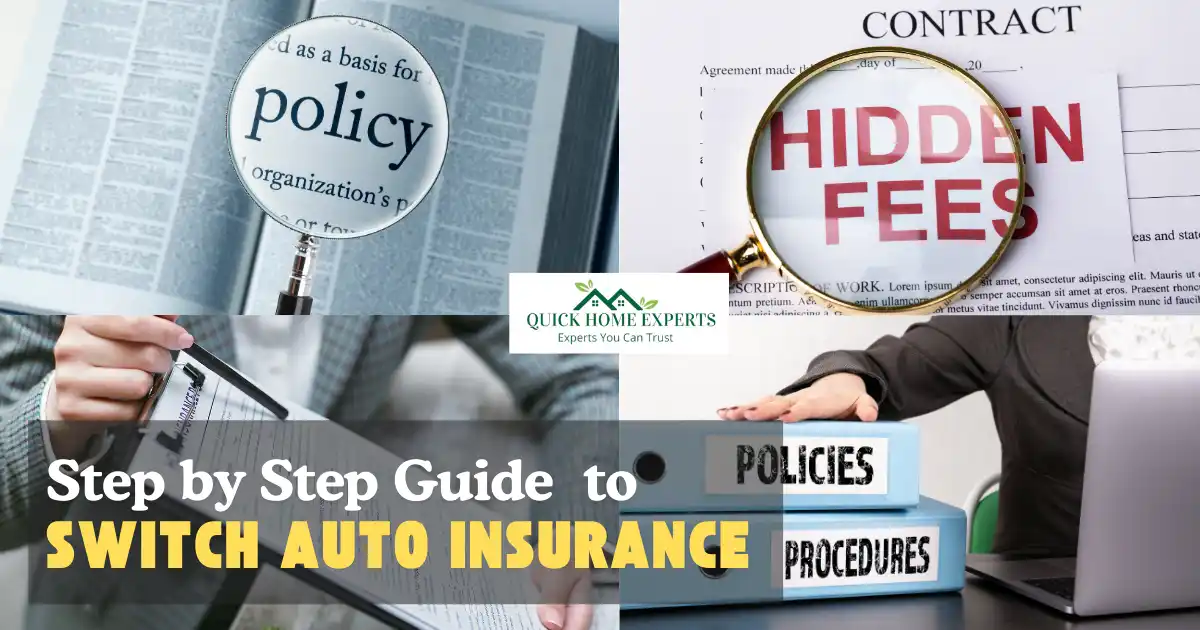The procedure to switch auto insurance companies for your automobiles may seem an intimidating and forbidding process however it’s actually the most efficient way to get a lower cost, gain greater coverage, or receive more efficient services for customers. If you’re not satisfied with the current insurance provider or discovered a lower price or your requirements have changed, then to switch auto insurance company isn’t a problem.
This thorough guide will walk you through each stage of the process starting with comparing quotes, and ending with the process of removing your current insurance policy to change insurance companies quickly and effortlessly.
What Is Auto Insurance Switching?
This process to switch auto insurance requires you to cancel the current policy and establishing a completely new one through a different insurance provider. It’s possible to alter your insurance at renewal or in mid term. You do not have to wait until your insurance policy is set expire in order for the change to take place.

Key Points:
- You can change your subscription anytime, however the timing is crucial regarding refunds as well as security.
- Always ensure that the current policy is into effect prior to revoke the old policy in order to ensure that there is no absence of coverage.
Cost of Auto Insurance by Policy Type
| Policy Type | Average Annual Premium (2025) |
|---|---|
| Minimum Liability | $500 – $900 |
| Full Coverage | $1,200 – $2,000 |
| Comprehensive Only | $300 – $600 |
| Collision Only | $400 – $800 |
| High-Risk Driver | $2,000 – $4,000+ |
Costs may vary based on the state, the vehicle, and the profile of the driver.
Cost of Auto Insurance by Vehicle and Driver Profile
| Vehicle/Driver | Average Annual Premium |
|---|---|
| New Car | $1,500 – $2,500 |
| Used Car | $900 – $1,500 |
| Young Driver (<25) | $2,000 – $4,000 |
| Mature Driver (50+) | $700 – $1,200 |
| Clean Record | $800 – $1,200 |
| With Accidents | $1,800 – $3,500 |
Factors Influencing to Switch Auto Insurance Rates

- Driver Records: Accidents, tickets and claims records.
- Type of Vehicle: Model, Make, Year along with security features.
- Place: State, city or even an Zip code.
- Credit Score: In many states, it could influence how much you earn.
- Coverage Level: Liability, comprehensive, collision, add ons.
- Discounts: Bundling, safe driver, multi car, loyalty, etc.
- Mileage: The number of miles do you cover throughout the year.
- Age and gender: Drivers who are younger and more male typically pay more.
Step by Step Guide to Switch Auto Insurance
1. Review Your Current Policy
- Be sure to be aware of your insurance coverage, deductibles as well as the cost for your insurance premium.
- Keep track of the date of your renewal along with any cancellation fees.
2. Shop Around and Compare Quotes
- Request quotations from a minimum of three reliable insurance companies.
- Not just price comparison, but also customer service, coverage and discount.
3. Check for Cancellation Fees and Refunds
- Certain companies may charge cancellation fees if departing at the halfway point the duration of your visit.
- You may be eligible to receive a prorated refund for any premium that is not used.
4. Switch Right on Time
- The best moment to switch is prior to the renewal date but you are capable of switching at any point.
- Verify whether your new policy starts before the time your previous one runs out.

5. Apply for the New Policy
- Provide accurate information regarding your car as well as its experience driving it, and the coverage you want to achieve.
- For discounts, ask about discount and bundle options.
6. Cancel Your Old Policy
- Make contact with the previous insurance company to terminate your insurance.
- Get a written acknowledgment of cancellation.
- Do not rely on your insurance company to cancel your insurance policy for you.
7. Confirm Your New Coverage
- Verify whether you have valid ID cards for insurance.
- Verify your coverage information and the date of your coverage.
8. Notify Your Lender or Leasing Company
If you’re the owner for a car loan, be certain to notify your lender about the changes in your insurance.
9. Update Your Insurance ID Cards
Save your insurance card in your car. be sure to change your state’s DMV as needed.
Common Mistakes to Avoid When Switching
- Coverage expires: You must make sure you have the latest coverage in place prior to rescinding the previous one.
- Beware of Comparing Coverage: Don’t concentrate on price be sure that the coverage is in line with your needs.
- You didn’t Remember to cancel your old policy: There is a risk from being double billed.
- Not receiving discounts: Find out about discounts in the present.
- Notifying your lender: mandatory when you’re holding an agreement for a lease or loan.
- Cost of cancelling a contract cannot be included: You can add these costs in your calculations of savings.
How to Save Money When Switch Auto Insurance

- Bundle Policy: Combining the car with home insurance or renters.
- Increase your Deductibles: Higher deductibles lower the amount of your insurance premium.
- Maintain an impeccable driving record: Be aware of accidents and tickets.
- Ask about Discounts: Excellent pupil, safe driver low mileage, etc. The prices and discounts are different every year. Examine them.
- Enhance Your Credit Score: In several states, this can lower your interest rates.
Conclusion
The process of finding insurance providers to switch auto insurance for your vehicle isn’t a burden. Following a step by step procedure and comparing the choices and avoiding common mistakes, you can find the best protection. You’ll reduce costs and enjoy the peace of mind driving. The most important thing is to make sure that you don’t allow you insurance to expire and be sure to review the fine print before making any modifications.
FAQs
Is it possible to switch auto insurance at any time?
Yes, you can change policies at any time. However, be aware of cancellation charges and make sure your new policy is active before switching.
How will switching auto insurance affect my credit score?
No, it won’t affect your credit score. However, insurance companies might check your credit during the quote process.
Will I get a refund if I cancel my insurance early?
Most insurance companies will reimburse the unused portion of your premium, minus any cancellation charges.
What documents are required to change insurance?
Your driver’s license, car registration, current policy details, and payment information.
Can I switch insurance if I have an unresolved claim?
Yes, but your previous insurer will handle the claim. Be sure to report any outstanding claims to your new insurance provider.
How do I make sure I don’t have a lapse in coverage?
Start your new policy before you cancel your old one ideally on the same day.
Will my rates rise when I switch auto insurance?
Not always. Many customers save money by switching providers, but always compare prices and coverage.
